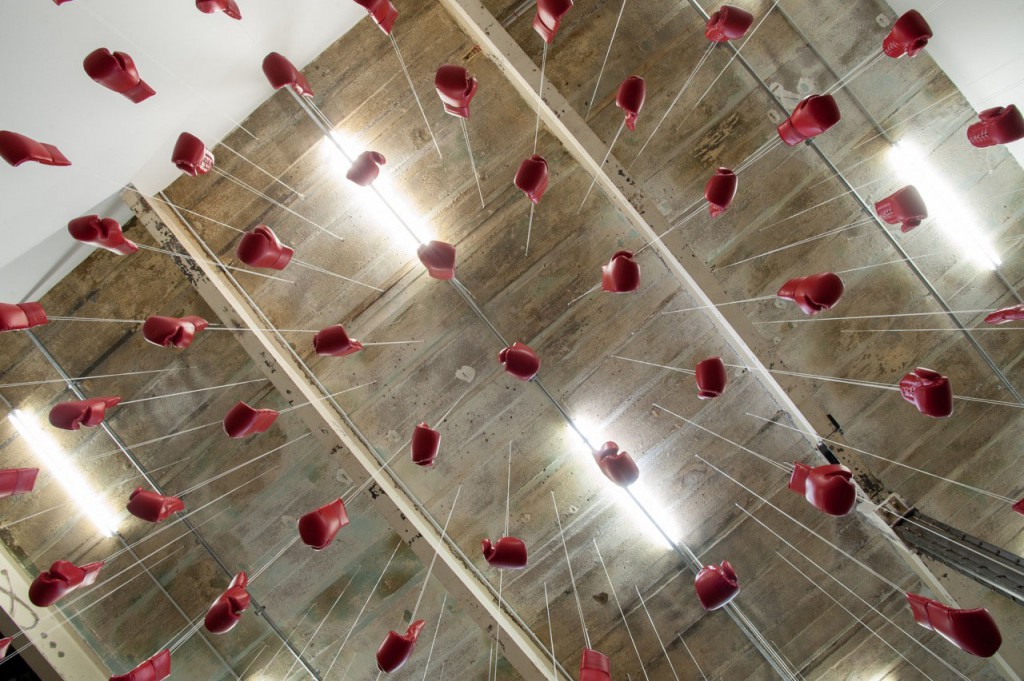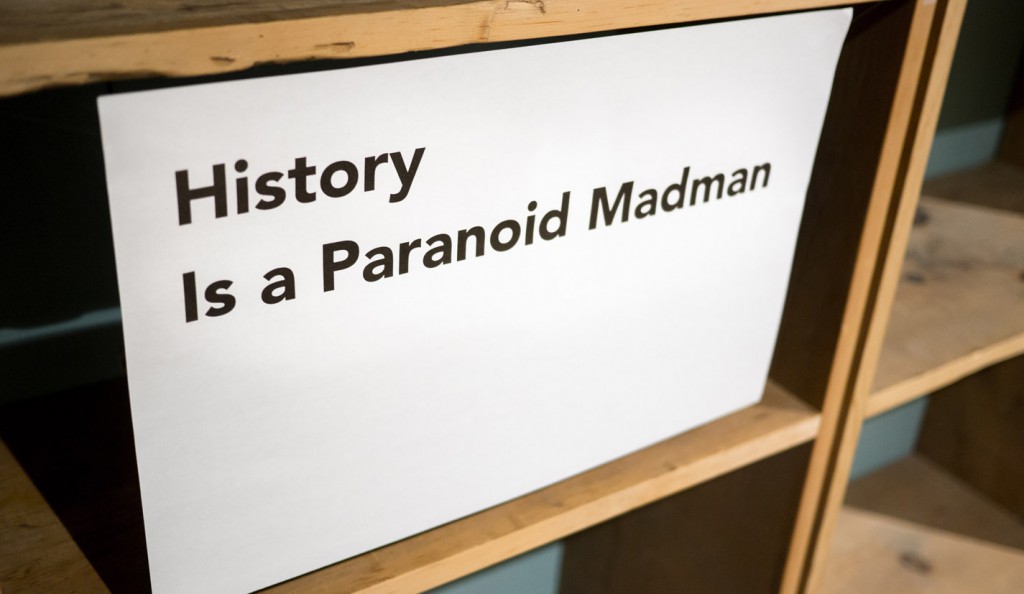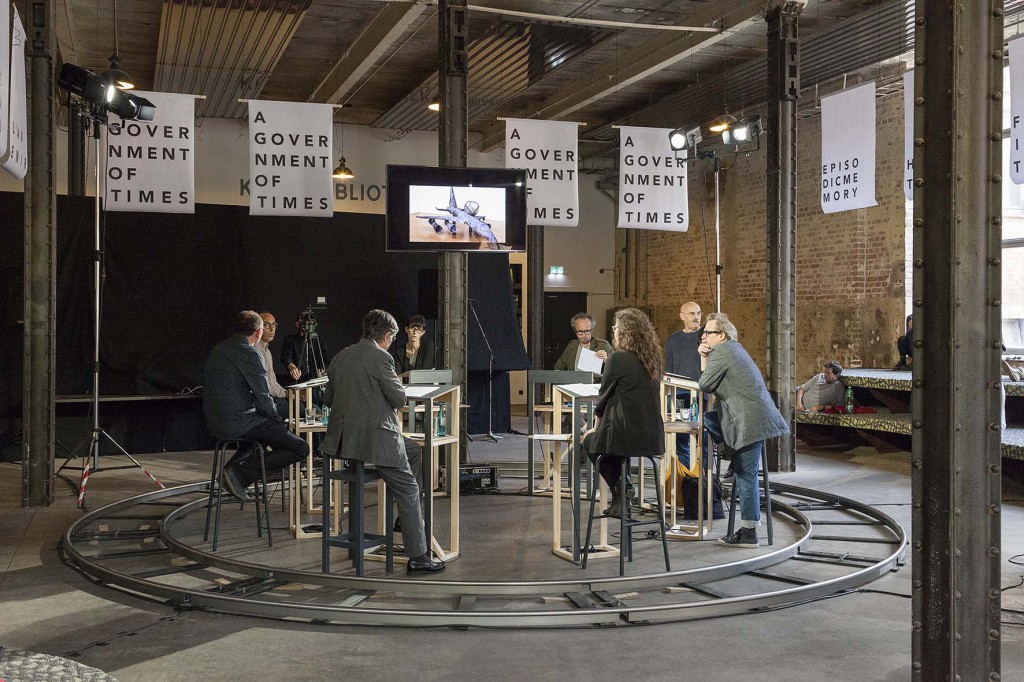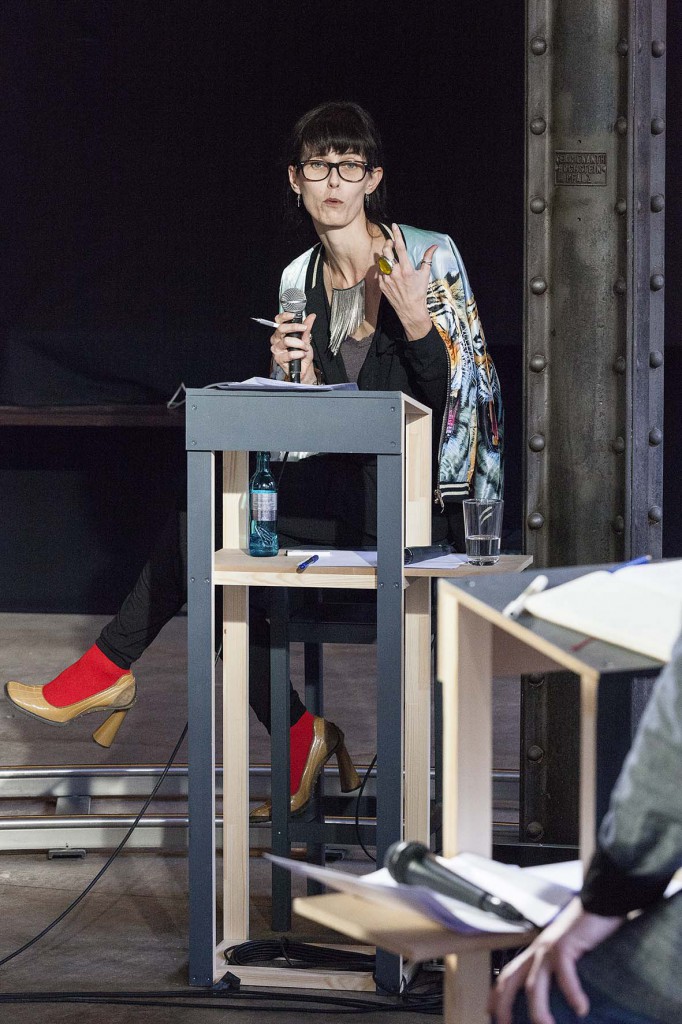As discursive highlight of the exhibition »Capitalist Melancholia« the french collective le peuple qui manque organizes the symposium-performance »A Government of Times«. International philosophers, historians as well as writers are invited to discuss alternatives to the acceleration of life in Capitalism.
Your performance »A Government of Times« is focusing on the concept of »presentism«. We’re hooked, can you explain the concept in greater detail?
LE PEUPLE QUI MANQUE The historian François Hartog explored crucial moments of change in society’s » regimes of historicity « or its ways of relating to the past, the present, and the future. According to Hartog, contemporary Western societies have entered from 1989 a new regime of historicity, into a » presentist regime of historicity «. He defines it as a temporal order of static historicity, characterized by the end of expected horizons and as an invasion of the present into the realms of the past and future.

A crisis of the future and an order of time which give us the feeling to be jailed in a perpetual present. The feeling that nothing really changes, the sense of history was lost, the future is locked. It is the congestion of the past, its obstinate over-presence, that poisons us in this exact moment, that we are going through; the overwhelming sense of powerlessness felt particularly in Europe, in these times of maximal political obstruction.
The aim of this event is to imagine what could be the next regime of historicity, how can we set time back in motion, how can we demand the future without returning to the modern vision of time – a linear and progressist vision of history? We are inviting theorists, poets, artists to propose advocacy for a new regime of historicity and to discuss and negotiate it with the other participants, coming from different intellectual genealogies. That is the issue and the challenge of this day : to produce a new government of temporality, following the philosopher Daniel Innerarity in his book, The future and Its Enemies (Stanford University Press, 2012). We invite the speakers to produce fictions and writings situated between forms of academic knowledge and forms of literary and poetic knowledge. We are deliberately using fiction as a form to invite the participants and theoreticians to position themselves outside of purely analytical writings but to enable them to propose very propositional statements.
We consider this day as a film shooting, as well. We will certainly include some film sequences into a film in progress that is called « Les Impatients » (the impatients), a chronopolitical serie which we started in Chicago some months ago, during a residency at the Rebuild Foundation. Its subject is the impatience of history, facing the crisis of the future which we are confronted with.

Is the subject of » time «, especially in the context of » contemporary accelerationism «, something that engages you personally?
LE PEUPLE QUI MANQUE As opposition to presentism, a new wave of contemporary accelerationism recently emerged, as a way to put time back in motion. For them, the only way out of capitalism would be to take it further, to follow its lines of flight or deterritorialization to the absolute end, to speed-up beyond the limits of production and so to rupture the limit of capital itself. This new wave of accelerationists represented by the theoreticians Nick Srnicek and Alex Williams is very important for the understanding of the re-emerging intellectual debates on the left. Their aspirations to find visions of the future to imagine a post-capitalist world has lead accelerationism to convene newly modernity as an ideal. Although we position ourselves, kindly critically to these chronopolitical visions, we have to recognize that they have initiated a new grammar of temporality, a return of the future that was cruelly missing in contemporary political debates. In 2014 at the Centre Pompidou, we organized a kind of »mock trial« of #Accelerate, the Manifesto for an Accelerationist Politics, by Alex Williams and Nick Srnicek in a very minimal form. It was a critical and collective examination of the text and the debates were very intense. In the frame of »A Government of Times«, the accelerationist propositions are obviously very central, but also the temporalities which we like to call »non-aligned«, for example queer temporalities or afrofuturist temporalities. The challenge is to find compatibility, a possibility of composition (in a very Latourian perspective) between those different temporal regimes, which are in conflict, in a situation of concurrence in the contemporary debate. What interests us here particularly, is the scenography of the controversy, the staging of the current debate. Contemporary art has this tremendous tendency to capture the air of time, but also in a more predatory way, to ask constantly for newness and new concepts. Research as we know, faces the same problems sometimes. Strategically it becomes more interesting for young researchers to produce new concepts than to verify the strength of concepts done by others. With these stagings, we want to produce spaces, that operate as spaces of propositions, spaces of verification, spaces of negotiation, spaces to interpret and spaces to deliberate on the contemporary. The form of the trial for example is a wonderful device to interpret and also a possibility to verify hypotheses.

You’re working at the point of intersection of contemporary art and research – which relevant impulses do you observe currently in the everchanging world of art?
LE PEUPLE QUI MANQUE Actually, the accelerationists have emerged from this »in-between« and not from the classical department of philosophy or political sciences.
It’s interesting how this space without real institutions (or always in the margins of important institutions as biennals, museums, universities, …) produces nowadays so many theses, concepts and proposals. We can see here a real merging between theory and praxis, between poetry and theory, between very different fields of knowledge, and it comes from the art world.
How did the cooperation of Halle14 and »le peuple qui manque« come about?
LE PEUPLE QUI MANQUE Our friend, writer, artist and curator Camille de Toledo who engaged a series of exhibitions at Halle14, proposed to us to curate a symposium during the exhibition » Capitalist Melancholia « which was curated by Camille de Toledo himself, the historian of ideas François Cusset and Michael Arzt, curator and artistic director of Halle 14. It is an exhibition dedicated to this state of exhaustion – an exhaustion of energies, ressources, exhaustion of the possible, of the future, and thus of time itself – that is a peculiar form of melancholia : the specific form of late-capitalism, according the statement of the exhibition. That was a great opportunity to extend the work we began in Chicago and elsewhere about temporality and futurity and to do this beautiful cooperation with Halle 14.
Thank you !


Daniel Poller & HALLE 14
HALLE 14, Center for Contemporary Arts, Leipzig.
May 28th, 2016
1:30 to 7pm
Diann Bauer, François Cusset, François Hartog, Maurizio Lazzarato, Émilie Notéris, Benjamin Noys, Lionel Ruffel, Camille de Toledo, Tiphaine Samoyault
A symposium-performance curated by Aliocha Imhoff & Kantuta Quirós
in the context of the project Capitalist Melancholia
(cur. Francois Cusset, Camille de Toledo & Michael Arzt)
Scenography by Antonia Kamp.
With the support of Halle14 and Fonds Perspektive.
Participation fee: 4 € / 2 € (entry to the exhibition is included)
Language of the lectures: English.
Interview: Laura Kuthan